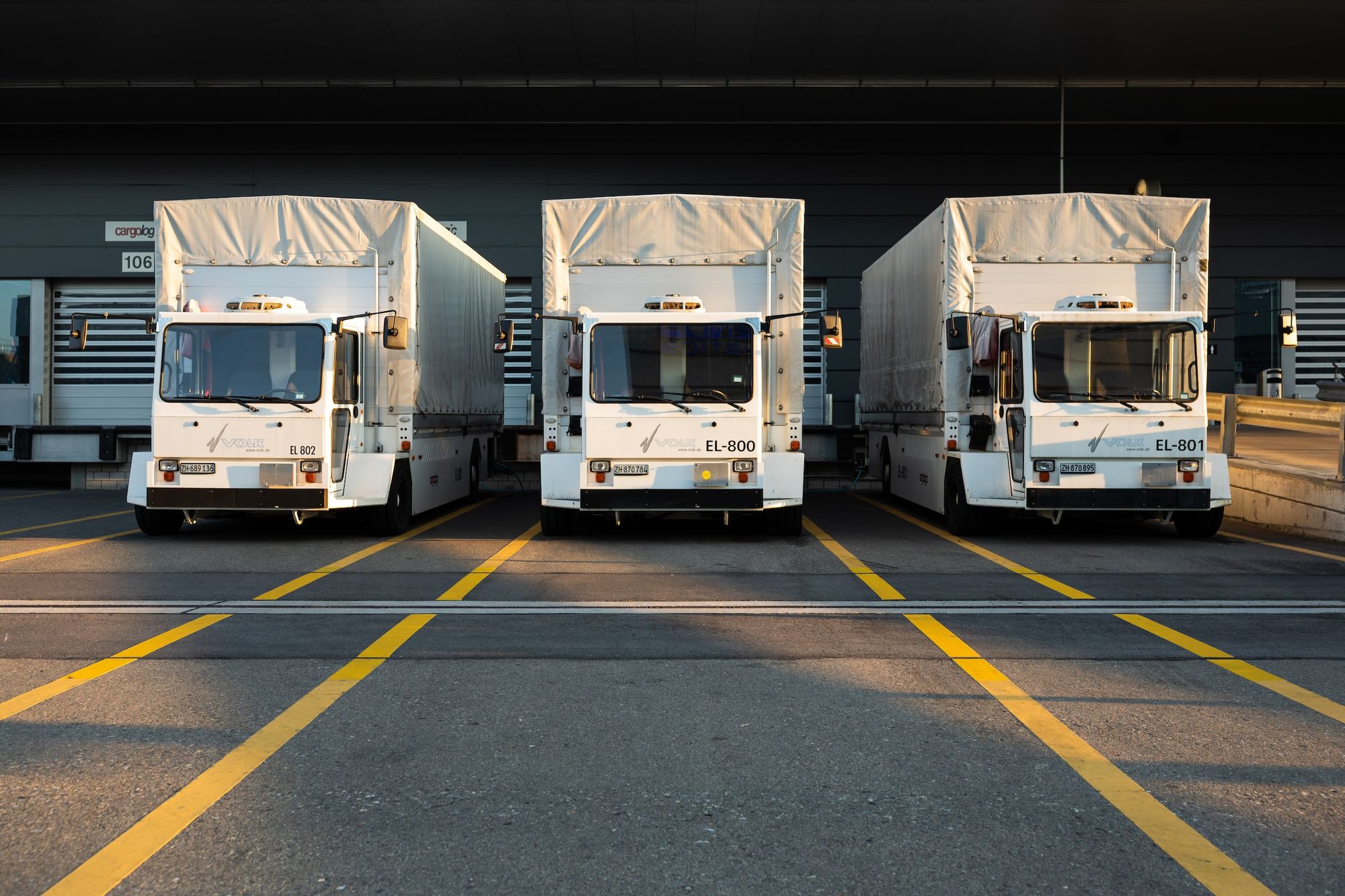The logistics sector takes a significant step toward becoming one of the major industries that contribute to the global economy. It is evident that transport and logistics industries are rapidly growing.
With the growth of eCommerce and the opening up of the global market, a transport and logistics industry needs to regularly monitor all of its assets. They have to track and schedule vehicle maintenance in addition to managing upcoming bookings, payments, and resources. Audits and repairs are more difficult because some data is frequently manually preserved in files.
So, the question of how to simplify work processes efficiently and effectively arises. And the answer to that is – ERP (Enterprise Resource Planning).
ERP for the logistics and transportation sector can fulfill all of the aforementioned responsibilities, and more crucially, it does so from a single or unified platform.
In today’s guide, we’ll thoroughly learn about Enterprise Resource Planning (ERP) for Transport and Logistics Industry and related concepts. Let’s take a look at what we’ll cover ahead:
- What is ERP?
- ERP for Transport and Logistics
- What are the Challenges of the Transport & Logistics Industry without an ERP System?
- ERP Solutions for Transport & Logistics Industry
- Benefits of ERP to Transport and Logistics Industry
- Impact of COVID-19 on Transport and Logistics Industry
- How Deskera Can Assist You?
Let's get started!
What is ERP?
Enterprise resource planning (ERP) is a tool that businesses employ to organize and manage the critical components of their processes and operations.
Businesses need a range of ERP technology software solutions since they aid in the execution of resource planning by combining all business functions into a unified system.
Enterprise Resource Planning is in charge of administering a number of processes that have an impact on how successfully a business is operated. In terms of software, it manages human resources, orders, inventories, accounting, and customer relationships (CRM), among many other things.
To put it in simple terms, the most straightforward way to explain an ERP function to a layman is that the software functions by fusing various functions and combining them into a particular system. This further enables it to streamline operations and distribute crucial information throughout the entire organization.
ERP solutions operate on a platform that is fundamentally a common database. Numerous business divisions use the numerous features that this platform enables.
To put it another way, it means that employees in different levels of work divisions, like accounting or sales, can completely rely on the same information for their specific needs and improve the performance of their company.
Therefore, ERP software is essential in the areas of transportation and logistics because of its various benefits.
ERP for Transport and Logistics
Logistics and transportation operate as a fiercely competitive sector that promotes economic expansion. Moreover, managing the logistics industry's operations and workflow can be highly challenging.
Enterprise Resource Planning (ERP) is– one well-known method for facilitating a streamlined flow of supply and demand in the transport and logistics industry. The system can surely operate a number of procedures without a glitch and handle new tumultuous conditions with ease.
A range of software-based business units can be managed via a central system. Since they combine all of a business's critical components into a single platform, ERP solutions are essential.
ERP systems today offer a number of new functions. It includes a single view of the entire supply chain, vendor portals, a product-by-product view, and much more.
In a similar line, it is a trustworthy platform that aids companies in managing production, supply chain modules, asset management, maintenance costs, and several other jobs.
Additionally, there are features to produce purchase order entries to buy products, shipment of orders and invoices for those shipments, sales order entries to raise orders, and many other things.
The business can optimize and automate some processes in order to improve operational effectiveness and profitability. Furthermore, ERP assists to gather extensive analysis and relevant data to enhance the performance of the supply chain in every way.
Furthermore, the use of enterprise resource planning software in conjunction with all other external products gives you a complete picture of all the important company processes.
All in all, a transport and logistics company can manage key business processes, such as customer satisfaction, logistics management, resource management, and process optimization for optimal efficiency, client retention, and profitability, with the help of ERP software.
What are the Challenges of the Transport & Logistics Industry without an ERP System?
The transport and logistics sector must adopt a uniform enterprise-wide IT platform to meet its challenges. Additionally, selecting a suitable and complete solution will greatly raise the worth of your company. Many businesses now use enterprise resource planning software to create the best plans for transporting goods and services.
Additionally, the top ERP system aids in avoiding challenges like:
Lacking Real-time Monitoring and Feedback
Maintaining real-time visibility of all operations is crucial for any organization, including the transport and logistics industry. It further helps the industry to control and follow the entire transport process and maintain transparency with their clients or customers.
However, managing operations without an ERP system will be extremely difficult for the transport and logistics sectors.
Allocation of Orders
Consider the following example to better appreciate the importance of automatic order allocation:
If your company receives 60 orders per day, it would be simple for your staff to categorize them according to the type, delivery location, weight, and other restrictions. What if you get 800 orders every day? Would your group be able to separate them simultaneously? Of course, it would take more time and labor.
Moreover, you will undoubtedly lose track of managing orders without an ERP system software, and the entire process will halt.
Increased Transportation Expenses
Operations requiring a big staff, such as manual order distribution, route planning, vehicle maintenance, extended drive durations, etc., may result in increased transportation costs. The capacity of your current vehicle might not be used to its full potential, necessitating an upgrade and raising prices.
Inefficient Data Management and Coordination of Customer Deliveries
One of the key priorities for the transportation and logistics sector is completing orders by the deadline. Several sectors grapple with inadequate coordination and inefficient data handling when it comes to client delivery. Following that, it immediately has an impact on client satisfaction.
Inadequate Warehouses and a Complicated Tax system
The transport and logistics industry faces numerous challenges as a result of the complex tax system. Multiple State and Federal taxes result in a significant loss of road travel time.
One of the few significant issues in this sector is the poor condition of warehouses and their constrained placements.
The lack of incentives to build a sizable integrated warehousing space results from the very dispersed nature of storage facilities for low-margin products.
Poor Accounting Management
The transport and logistics industry requires efficient accounting management. Monitoring cash flow, budgeting, cash management, ledger, and other things will be quite challenging without ERP. It will also have a detrimental impact on the judgement of higher authorities.
Lack of Availability, Timeliness, and Visibility of Status
The transportation and logistics sectors must monitor availability, time, and visibility status to stay on schedule. Without an ERP system, managing these operations in an industry is extremely difficult, which results in inefficiencies, delays, and interruptions.
Inefficiencies in Consignment Tracking
The status of your shipment may be inquired about on hundreds of calls made daily by a crew from your traditional transportation system. Instead, it is suggested that you spend your money on a suitable Transport & Logistics ERP because it is time-consuming and exhausting.
Extensive Reporting and Data Analysis that is Ineffective
Companies in the transportation and logistics sector must prioritize thorough reporting and data analysis.
Moreover, it would be quite challenging for them to obtain access to all the data they want to make educated decisions, which guarantees accurate reporting, without an ERP platform.
Addressing internal and external goals may also be facilitated by timely report creation using data.
The organization has more time to cater to demands for complicated data reporting as a result, making it easier to satisfy industry reporting standards.
Incapable of Consistently Adhering to Trade Laws and Rules
The transportation and logistics sectors are subject to strict compliance requirements set by state governments and other authorities. Without ERP, it will be difficult to consistently follow trade laws and regulations.
To minimize various risks associated with logistics management, invest in cloud-based ERP solutions. Second, it can greatly lower expenses and streamline corporate processes.
ERP Solutions for Transport & Logistics Industry
ERP software that boosts productivity, handles security concerns and keeps costs in check to offer your transportation company the edge.
With an ERP software solution, your performance in the transportation industry might rise. It helps with managerial monitoring and decision-making, keeps tabs on how many daily operations actually cost and perform activity-based costing tasks.
Deskera ERP offers a commitment to developing, deploying, and maintaining cutting-edge transportation management software for your logistics company. Companies in the logistics sector struggle with their accounting processes.
Real-time Monitoring & Tracking
A company may control and follow the entire transport process and uphold complete transparency with its clients by having comprehensive visibility over the entire voyage.
Both of these objectives can be accomplished with transportation software. Businesses may also make it easier for drivers to schedule jobs, plan trips, upload digital delivery evidence, and other tasks.
Automatic Allocation of Orders
This procedure can be completed more quickly by automating order allocation. This much is accurate. In order to review incoming orders and categorize them in accordance with the given criteria, your current ERP can easily be coupled with transport management software. The computer automatically looks for the right vehicle and driver to fulfill the request after categorization.
Reduce Fleet Operating Costs
Bundling, cross-docking, and continuous movements are some strategies that might help you maximize the usage of your fleet while monitoring operating and maintenance expenses.
Enhances Efficiency of Data Management and Coordination of Customer Deliveries
ERP is the solution that helps to enhance the efficiency of data management and coordination of customer deliveries.
Manage Your Whole Warehouse with Just One Click
This ERP for Transport & Logistics provides the best warehouse management software available anywhere in the globe. Real-time warehouse data makes it simpler than ever to make more informed judgments.
Administers Accounting Features
The ERP system's comprehensive accounting capability makes a wide range of financial management tools available for the transportation industry.
Some of these functions include managing sales orders, accounts payable, accounts receivable, general ledger, budgeting, cash flow, and cash management.
Manage Drivers
Enterprise Resource Planning (ERP) software assists to automatically track the driving hours, location, license, activities, and other conduct infractions of a driver. With less time and money spent on your personnel, you can therefore claim a more polished outcome.
Payment and Estimating Costs for Transportation Services
Your company needs an ERP system that can ensure appropriate price flexibility while producing invoices. Using the features offered by the ERP platform, you can generate price estimates based on freight billing, costing, and other transportation-specific pricing.
Effective Consignment Status
You can lower overall costs and increase your profit margin by spending less time, effort, and resources on things like monitoring driver information, getting consignment status, and route management.
Effective Reporting and Data Analysis
If your transportation & logistics company has an integrated ERP, you can simply control every part of your operations from a single dashboard. ERP without a doubt boosts the effectiveness of all procedures and operations in the transport & logistics industry.
Business analysis comes next and is an important step. Additionally, ERP gives you access to all of the information relevant to the transport and logistics sector. The primary duty of ERP is to provide comprehensive analytical and traceability capabilities for all industries.
Optimally Utilize Vehicle Capacity & Tracking Vehicles
With the right strategies in place, you may make the most of your vehicle's capacity and avoid spending money you don't need to.
Furthermore, you can view your vehicle's route history, speed, current position, sites visited, and driving style with just one click. Receive SMS and email notifications for traffic updates in real-time.
Combining Automated Route Planning and Optimization with Dynamic Route Planning
The ERP software includes the option of dynamic route planning and automatically selects the most effective routes for each vehicle.
After an order has been shipped for delivery and the end user changes their delivery address or time, the change is effective. Furthermore, after informing the driver that the client has rescheduled the delivery, the software presents a new route that excludes visiting that customer.
To design excursions, obtain specific waypoints and instructions. Plan your trips and choose the least-congested routes.
Able to Constantly Follow Trade Laws and Regulations
Strong compliance standards have been established for the transportation and logistics sectors by state governments and other authorities. ERP makes it easy to adhere to trade laws and regulations consistently.
Therefore, it is important to invest in cloud-based ERP systems to lower the many risks associated with transport and logistics management. Also, it simplifies company processes and helps to stay on track on all aspects.
Benefits of ERP to Transport and Logistics Industry
The administrative and operational environment can be greatly enhanced by integrating ERP with logistics and transportation. For better organizational management, ERP software is required. Therefore, integrating various functions may have an impact on how effectively a company operates.
Following we have discussed some crucial benefits of ERP associated with Transport and Logistics Industry. Let's learn:
Planning for Delivery and Inventory Management
With total control over the inventory, it ensures operational performance. On a centralized system, you may view all the information and specifics pertaining to orders, incoming and outgoing deliveries, and more.
Therefore, it is essential for operations to run smoothly to optimize all supply chain management procedures and manage all significant projects through a single dashboard. Better dispatching or order planning will result from this. Therefore, it is essential for operations to run smoothly to optimize all supply chain management procedures and manage all significant projects through a single dashboard. Integrating delivery route optimization software with ERP can further enhance your logistics processes by providing better delivery planning and dispatching.
Data Management and Compliance
The majority of data can easily be managed without human errors or mistakes using logistics ERP software. Access is available to consignment notes, manufacturing costs, shipping taxes, and other essential and precise data. The system also has the ability to process and store logistics regulatory compliance processes.
With the aid of a centralized database, businesses can make educated decisions and protect the security of their data in the cloud.
Increased Distribution
Accelerating delivery times can be very beneficial to the logistics sector. With the use of a single dashboard ERP system, all distributors, suppliers, delivery partners, and retailers may access thorough delivery information.
To ensure effective distribution management, they can also monitor the delivery zones, orders, stock, payments, etc. The method can be used to plan the routes for punctual deliveries.
Solutions for logistics ERP software are crucial for a company's overall growth since they can control irregular cost changes and increase output. Using intelligence-embedded technology to separate an organization from the competition is the greatest strategy.
Greater Transparency
Real-time tracking technologies are integrated into ERP software, allowing for a thorough insight into the supply chain process.
For instance, allowing cloud deployment can help you track a significant amount of data in real time. You can enhance business operations by discovering the vehicle's precise location and following its route with a GPS tracking device.
Additionally, the system provides inventory visibility to control changes in supply and demand.
Employees Management
For improving workforce management, an integrated ERP platform is helpful. You may keep tabs on the freight operators' breaks, vacations, pay bonuses, overtime, etc.
Therefore, keeping an eye on all of the operations that go under human resource management will aid you in making better decisions regarding your employees. Logistics businesses can use this information to improve personnel management and make well-informed judgments.
ERP systems are regarded as excellent tools for labor management that can be used in the logistics industry. Moreover, with the help of an integrated ERP platform, managers in the freight operations division can keep an eye on employees' working hours, break periods, leave monitoring, and other distinguishing characteristics.
Using the key performance indication tool included with the ERP software, managers may receive pre-made reports on employee performance, enabling them to make better hiring decisions.
Improved Customer Service
The ERP software compiles and stores all customer data in a database. All subsequent pertinent actions are then connected to the client account. The user can manage and keep track of the policies and claims for each client.
The choice for customers to file an urgent request for any data rectification exists. The CRM module manages all aspects of sales administration, including lead nurturing, conversion tracking, and sales forecasting. It also improves customer service and client relationship management.
Customers want to know everything about the status of their on-time delivery. Your social network and the location of a shipment are now equally related to you. Customer expectations have increased, but they are less willing to pay more for accelerated shipping.
Fuel Administration and Logging
Systems for measuring and monitoring fuel use in the transportation and building industries work well. They are generally utilized for fleets of vehicles, such as those employed in aviation and rail-based passenger and cargo transportation. They employ a range of methods and tools to keep an eye on and track fuel inventories, purchases, and distributions.
This data can then be saved in the ERP application, where it can be utilized to generate reports that can be used to direct management practices.
In contrast to the back end of an automated fuel management system, web portals are utilized to provide in-depth fuel statistics online. This enables the control of fuel usage, cost analysis, and tax accounting.
Remote Access to your Business
Another flexible benefit of having ERP software installed for the logistics and transportation industry is remote location access.
Business bosses might not always be able to keep logging into their office systems continuously. Due to ERP software, you may access your account from any place with an internet connection. As a result, management and operators may constantly communicate.
Enhanced Business Intelligence and Distribution Management
When employing an ERP system with a single dashboard, suppliers, distributors, drivers, and managers may accurately track their incoming and exiting logistics.
This improves the shipper's control over the entire logistics operational process' efficacy and transparency. They may easily find out details on customers, distributors, the live status, and many other things.
Business leaders may more easily make decisions, understand ordering trends, identify the reasons for any delays, and successfully handle customer escalation once they have all the data they need.
Logistics Relationship Management
Transportation and logistics refer to a large group of tasks and operations, including the transfer and control of different resources across the supply chain.
By managing suppliers and logistical partners, ERP software streamlines the operations of your business.
Securely Access your Vendor Portal
The first way ERP aids logistics and transportation is by providing secure access to the vendor portal. A secure login page for registered users is included in every piece of ERP software used in business operations.
This permits secure access to their account so they may view the status of the logistics and other important data. The user can subscribe to SMS or encrypted email systems that are integrated into all conversations to get updates to their personal profiles.
Optimized Stock Visibility and Inventory Control
Having crucial inventory control is one of the most important aspects of maintaining operational proficiency in logistics and transportation.
The stock, current deliveries on the route, current requests, and sales total are the most crucial metrics to keep an eye on.
Business owners can keep a close eye on the present status of their inventory using ERP software because it unifies all notable works under a single dashboard.
Therefore, it can be urgent to exert influence over the logistics and transportation industry by providing them with the tools and information they need to handle incoming or outgoing orders, tally the number of things in the inventory, and spot out-of-stock items.
Executives and managers in the logistics industry may make better decisions more rapidly by fully understanding the inventory position when dispatching or placing orders.
Easy Schedule for Maintenance and Transportation
The major assets in the logistics and transportation industry are the vehicles and the person in command of the vehicles.
As the logistics network becomes more intricate, maintaining and planning transportation schedules becomes increasingly difficult.
Over time, these scheduling issues could have a negative impact on the logistics and transportation sectors. ERP software solutions substantially simplify the process for the organization while providing complete control and visibility over the whole logistics or supply chain network. This finally enhances the operational smoothness of the company.
Complete Control and Visibility
The major assets in the logistics and transportation industry are the vehicles and the person in command of the vehicles.
As the logistics network becomes more intricate, maintaining and planning transportation schedules becomes increasingly difficult.
Over time, these scheduling issues could have a negative impact on the logistics and transportation sectors. ERP software solutions substantially simplify the process for the organization while providing complete control and visibility over the whole logistics or supply chain network. In the end, this increases the operational effectiveness of the company.
Impact of COVID-19 on Transport and Logistics Industry
The logistics industry is a core component of any economy and is currently experiencing severe hardship.
In order to connect its facilities to markets for the distribution of finished goods and the supply of raw materials, the global manufacturing sector depends on the logistics and transportation sectors.
Nevertheless, despite the fact that the current infection rates give the impression that there is some relief in sight, restrictions and other pandemic-related risk factors will continue to affect and disrupt the world supply chain.
The variables that are now affecting the logistics sector, the global supply chain, and the overall global economy are covered in the sections below.
Furthermore, these variables range from changes in demand to issues with supply chain inventory control, demand for fulfillment and delivery fluctuations, production line interruption, halting of transport & logistics management, and operational limitations.
However, you can advance and improve your transport and logistical sector at a quicker and better rate with the aid of an ERP software.
How Deskera Can Assist You?
Deskera is the One-Stop Platform for Managing Your Business. Get the advantages of ERP, Integrated Accounting, CRM, and HR Software for Business Growth — all in one place.

Our integrated ERP software will assist your business with customized dashboards, inventory management, finance management, order management and fulfillment, revenue recognition, customer support, budgeting, statutory compliance management, and so much more!
Instantly generate automated invoices, leave, attendance, payroll, and other expenses. Generating pay slips for your employees is now easy as the platform also digitizes and automates HR processes.
Final Takeaways
We've arrived at the last section of this guide. Let's have a look at some of the most important points to remember:
- Enterprise Resource Planning is in charge of administering a number of processes that have an impact on how successfully a business is operated. In terms of software, it manages human resources, orders, inventories, accounting, and customer relationships (CRM), among many other things.
- Maintaining real-time visibility of all operations is crucial for any organization, including the transport and logistics industry. It further helps the industry to control and follow the entire transport process and maintain transparency with their clients or customers.
- The ERP system's comprehensive accounting capability makes a wide range of financial management tools available for the transportation industry.
- Some of these functions include managing sales orders, accounts payable, accounts receivable, general ledger, budgeting, cash flow, and cash management.
- Another flexible benefit of having ERP software installed for the logistics and transportation industry is remote location access. Business bosses might not always be able to keep logging into their office systems continuously. Due to ERP software, you may access your account from any place with an internet connection.
- Having crucial inventory control is one of the most important aspects of maintaining operational proficiency in logistics and transportation. The stock, current deliveries on the route, current requests, and sales total are the most crucial metrics to keep an eye on.
Related Articles












